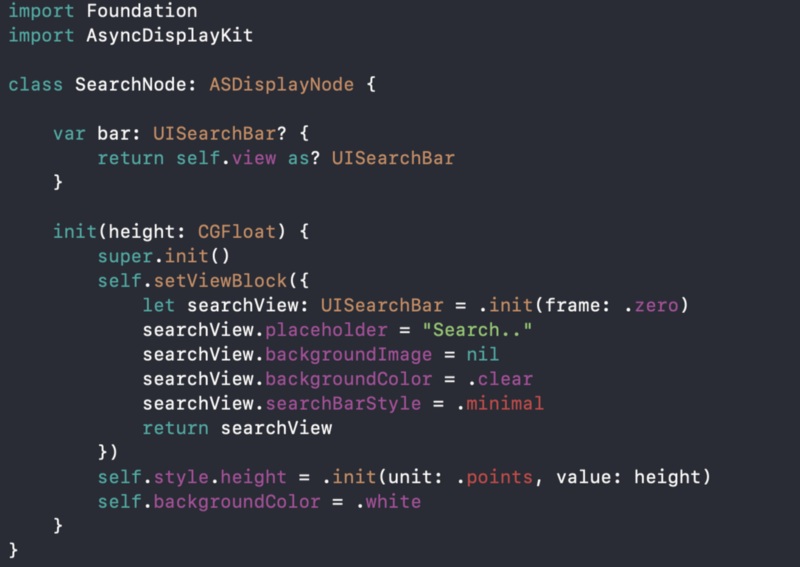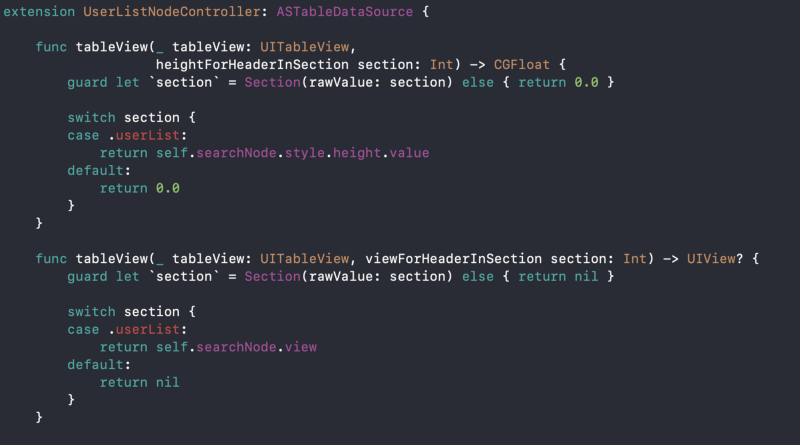Floating UISearchBar Best Practice With Texture(AsyncDisplayKit)

Today, I wanna show you that customized UISearchBar with Texture
Unfortunately, ASTableNode doesn’t support ASDisplayNode returnable delegate method for header in section.
So, How to attach Floating UISearchBar on ASTableNode?
1. Make UISearchBar wrapped ASDisplayNode
It’s very simple, http://texturegroup.org/docs/display-node.html Texture support View-Wrapping
In some cases, it is desirable to initialize a node and provide a view to be used as the backing view. These views are provided via a block that will return a view so that the actual construction of the view can be saved until later. These nodes’ display step happens synchronously. This is because a node can only be asynchronously displayed when it wraps an _ASDisplayView (the internal view subclass), not when it wraps a plain UIView.

bar property is convenience access property which wrapped UISearchBar from ASDisplayNode
2. Install SearchNode on ASTableNode
At first, you make searchNode property


searchNode style property has height value as ASDismension. so, you just return height from height for header in section delegate method.
and next, just return view property from view for header in section method.
you can see below screen shot


3. How to make expanded search bar
At first, you should know about constrained size layout system mechanism.
Layout API Sizing
_Texture_texturegroup.org
Size Range (ASSizeRange)
UIKit doesn’t provide a structure to bundle a minimum and maximum CGSize. So, ASSizeRange was created to support a minimum and maximum CGSize pair.
ASSizeRange is used mostly in the internals of the layout API. However, the constrainedSizevalue passed as an input to layoutSpecThatFits: is an ASSizeRange.
SwiftObjective-C
- (ASLayoutSpec *)layoutSpecThatFits:(ASSizeRange)constrainedSize;
The constrainedSize passed to an ASDisplayNode subclass’ layoutSpecThatFits: method is the minimum and maximum sizes that the node should fit in. The minimum and maximum CGSizes contained in constrainedSize can be used to size the node’s layout elements.
Let’s make AdvencedSearchNode


I will reuse searchNode which is already made.


and next, I will attach hash tag UIs below the searchNode.

Finally, Just define LayoutSpec at layoutSpecThatFits method

Also, you just make searchNode property like a upper screenshot

viewForHeaderSection is the same as described previously.
Most Important is height for header in section. In other words, it have to calculate AdvencedSearchNode height.
So, How to calculate node height from viewForHeaderInSection method?

A lot of Texture newbie will access calculatedSize or bounds properties.
When you access upper properties than you can’t get expected height. Because, these doesn’t know constrainedSize
So, you just define constrainedSize(ASSizeRange) and call calculateLayoutThatFits method.

ASSizeRange has minSize and maxSize parameter. minSize is zero and maxSize is superNode bounds size which is maximum constrainedSize for childNode(searchNode).

Thank you!

[Job announcement] We’re looking for colleagues to grow together in Vingle
_Very Community, Vingle!_careers.vingle.net